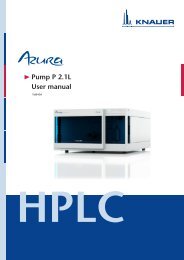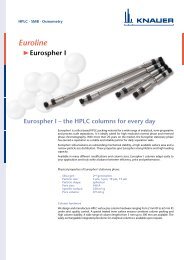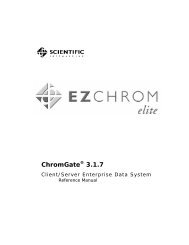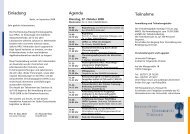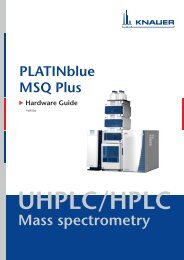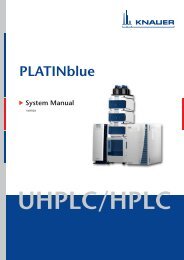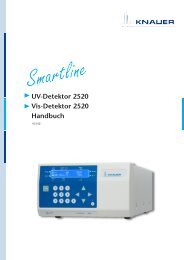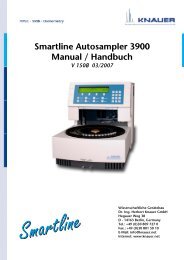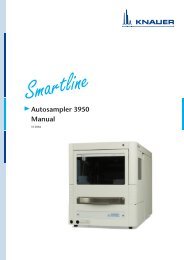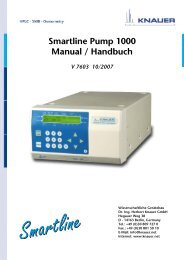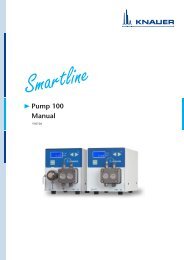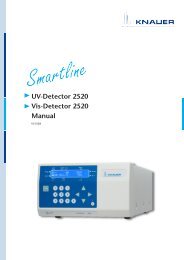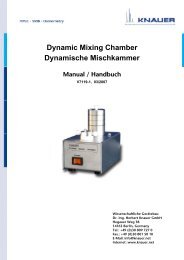ChromeGate 3.3.2 Software Manual - KNAUER Advanced Scientific ...
ChromeGate 3.3.2 Software Manual - KNAUER Advanced Scientific ...
ChromeGate 3.3.2 Software Manual - KNAUER Advanced Scientific ...
You also want an ePaper? Increase the reach of your titles
YUMPU automatically turns print PDFs into web optimized ePapers that Google loves.
258 SEC Option<br />
Universal Calibration<br />
Universal calibration allows a narrow range polystyrene standard<br />
calibration curve to be used to calibrate for a broader range of polymers.<br />
Using the relationship between the hydrodynamic volume, (the product of<br />
the Molecular Mass M and the intrinsic viscosity [�]) of the polymer and<br />
its elution time), the narrow range calibration curve can be adjusted to<br />
more closely fit the sample being analyzed.<br />
The intrinsic viscosity [�] of a polymer is experimentally determined from<br />
directly measuring the viscosity of the polymer solution. It is related to<br />
the polymer Molecular Mass through the Mark-Houwink equation<br />
[�]=Km a<br />
where K and a are constants that vary with polymer type, solvent, and<br />
temperature. Tables have been published that contain K and a constants<br />
for a wide variety of polymers. Thus, using published values for K and a,<br />
or the measured viscosity of the polymer, one can determine Molecular<br />
Mass information for the sample.<br />
Applications of SEC<br />
SEC is used commonly for quality control of high Molecular Mass<br />
polymers. Molecular Mass distribution is indicative of the physical<br />
properties of the polymer. Such properties include strength, flexibility,<br />
and tackiness, among others. Because the shape of the broad SEC<br />
peaks can vary, in many cases simply examining the average Molecular<br />
Mass number is not adequate to characterize the polymer, as two<br />
polymers can have the same average Molecular Mass but very different<br />
weight distribution. It is therefore important to evaluate a range of<br />
different Molecular Mass calculations, as well as examine the actual peak<br />
shape (overlay comparisons are helpful here) to get a good indication of<br />
polymer quality.<br />
The various different Molecular Mass numbers are used to characterize<br />
different properties of polymers, as follows.<br />
MN<br />
MW<br />
MZ<br />
MV<br />
Number-average Molecular Mass , is used in determination of<br />
flexibility and tackiness of samples, which is a function of the<br />
proportion of low-Molecular Mass material.<br />
Weight-average Molecular Mass , is indicative of the strength of<br />
the polymer, as it gives an indication of the proportion of high-<br />
Molecular Mass material in the sample.<br />
Z-average Molecular Mass , is used to determine brittleness,<br />
and indicates the proportion of very high Molecular Mass<br />
material in the sample.<br />
Viscosity-average Molecular Mass , is used to relate the<br />
average viscosity of the sample to its Molecular Mass .<br />
MW/ MN Polydispersity, is an indication of how homogeneous the<br />
sample is. A low number indicates more homogeneity, or<br />
narrow Molecular Mass distributions. Higher numbers indicate<br />
more complex polymers.<br />
Using ChromGate ® SEC <strong>Software</strong><br />
The ChromGate ® Size Exclusion <strong>Software</strong> is an optional package that<br />
enables ChromGate ® Chromatography Data System to perform SEC<br />
calculations. Once the SEC option is enabled, it is possible for the user<br />
to configure any one (or more) of the instruments connected to the<br />
system as an SEC instrument. It is also possible to perform normal<br />
partition chromatography calculations on some instruments, while<br />
performing SEC on other instruments. (Note that SEC and partition



